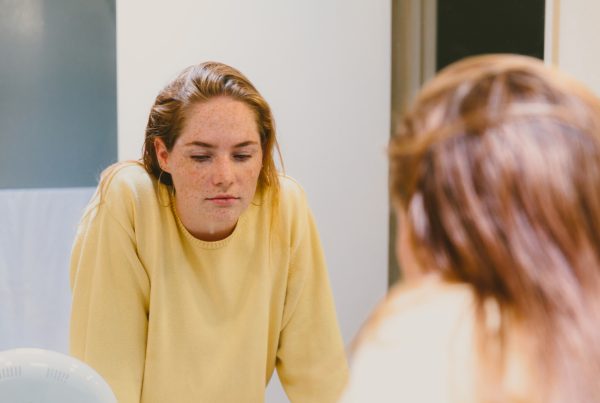Adolescence is a rough time. Teenagers are faced with a myriad of physical, social, and behavioral changes while learning to survive adulthood, coping with a growing awareness of the world around them, and facing brand new responsibilities each day.
For some teens, these challenges are coupled with the onset of unexplained and unfortunate mental health symptoms, some of which can drastically alter and affect their thoughts and behaviors. These symptoms can greatly amplify the already challenging road ahead, often leading to mental health disorders that require attention and care.
A lot of teens enter the last years of their childhood feeling alone, overwhelmed, and anxious about the past, present, and future. Helping them navigate their way into the world while coping with their unique issues is difficult but never impossible. Finding support is crucial, both in the community and professionally.
But beyond therapy and support, it’s the day-to-day that makes the most impact on how a teen feels. It’s essential to find mental health activities that help your teen cope with their stressors and symptoms. Remember, as a parent, your influence on your teen is paramount – and in the grand scheme of things, you will always be your teen’s most prevalent therapist. Here are a few mental health activities that can help right away.
Understanding Mental Health
Mental health is a cornerstone of our overall well-being, encompassing our emotional, psychological, and social health. It influences how we think, feel, and act in our daily lives. Good mental health allows us to handle stress, build strong relationships, and make sound decisions. Conversely, poor mental health can lead to issues such as anxiety, depression, and even substance abuse.
Maintaining good mental health is as crucial as taking care of our physical health. Engaging in activities that promote mental well-being, such as regular exercise, healthy eating, and adequate sleep, can significantly enhance our quality of life. It’s also important to seek help when needed, whether through professional therapy or community support. By prioritizing mental health, we can improve our relationships, work performance, and overall happiness.
Factors Affecting Mental Health
Several factors can influence our mental health, ranging from genetics to lifestyle choices. Traumatic experiences, such as abuse or neglect, can leave lasting impacts on mental well-being. In today’s digital age, social media, peer pressure, and academic stress are significant contributors to mental health issues among teens.
Physical health is closely linked to mental health. Chronic illnesses like diabetes or heart disease can increase the risk of developing mental health issues. Additionally, poor sleep habits, unhealthy eating, and lack of exercise can negatively affect mental well-being. It’s essential to recognize these factors and address them to maintain a balanced and healthy life.
A Day in the Woods to Reduce Stress
It’s no panacea, but it’s still surprisingly effective most of the time. Simple woodland walks have a distinct effect on human psychology. This effect has been studied and cataloged for years, particularly on feelings of depression, confusion, and anxiety.
Also known by the Japanese term shinrin-yoku, or forest bathing, the act of taking a long stroll through a forest can immediately impact your teen’s mental wellbeing, coupling the soothing effects of being surrounded by nature with the physical benefits of natural light and fresh air, and the physiological benefits of a long, vigorous walk.
Forest bathing is more than just a therapy tool. It’s also an effective form of stress reduction and has been proven to be exceptionally useful in preventing stress-related health conditions. The stronger a person’s feeling of stress, or the heavier their overall burden of stress, the more effective the experience.
If you’re not exactly living to the closest access point to a natural forest, a walk in the park or a hike through nearby nature can still be an effective stress-reduction tool and a great bonding experience. Use the time to get to know your teen’s thoughts and interests better, and figure out how they’re feeling.
Starting a Handy Project Together for Personal Wellness
There are few things in life as satisfying as creating something with your own two hands, whether it’s in the form of tinkering with a soldering iron and a PCB or creating a birdhouse out of fresh lumber. If you’ve always been handy in one way or the other, consider inviting your teen into the garage for a two-person project.
Tune up the bike together, work on your project car or do whatever else you might enjoy. It doesn’t have to be woodworking, tinkering, welding, or mechanical work – you could work with your teen on another kind of creative endeavors, such as a joint painting exercise, a sculpture, or something completely unorthodox, like coding a game together. Think of which of your hobbies or interests your teen might have an interest in as well, as to give them a chance to experience it through their lens.
Exploring Your Teen’s Interests
Working on something together for the first time can be a great bonding experience and can help provide your teen with the satisfaction and self-esteem boost that comes from taking part in the creation of something unexpected and creative.
But that experience should go both ways. If you’ve helped your teen discover a new interest for themselves, you should give them a chance to share an experience with you as well. One of the most insidious symptoms of depression is that it saps the joy out of experiences that used to be fun.
Forcing oneself to pick up an old hobby and spend time with it can combat depressive feelings and help cheer a person up. Use this opportunity to ask your teen to share their interests with you and help them feel a bit better.
Train With Your Teen
If your teen is an athlete or enjoys sports, then another way to spend time together and simultaneously help them cope with their mental health is by getting active. Go for a jog together, hit the weight room together, practice drills, and train together.
Help your teen improve their skills on and off the field while benefiting from the mental and physiological effects of the enormous endorphin release of exercise.
If your teen isn’t very active, then this would be a great time to try and find a way for them to enjoy physical activity. Exercise is one of the most effective ways to modulate stress and reduce mental health symptoms over the long term, and it’s an incredibly potent coping mechanism for nearly any mental health diagnosis and multiple different physical chronic health conditions. And as with any other habit, it pays to get started young.
Forcing your kid to get up at sunrise and go for a jog each morning might not be the best approach, but you can consider setting an example by being more active yourself and encouraging your teen to try out different mental health activities with you. Not everyone is a fan of track-and-field, but if you can identify your teen’s unique physical talent and interest – whether it’s dancing, swimming, lifting, contact sports, ice skating, biking, hiking, climbing, or anything else – then you’re helping them discover an enormously beneficial therapeutic tool.
Letting Your Teen Spend Time Alone
Spending time together is beneficial for several reasons: it lets you keep an eye on your teen, encourages them through an activity they might not want to engage in to begin with, and help them see things through.
But teens are quickly becoming young adults and need boundaries, privacy, and a sense of self-determination. Of course, support is critical. But you can’t hover over them through every step of therapy, let alone life. Encourage your teen to make the most of these mental health activities and incorporate some of them into their daily schedules – and give them the space to choose how to spend their time and live their life.
Overcoming Mental Health Issues
Overcoming mental health issues often requires a multifaceted approach, combining self-care, social support, and professional help. Engaging in activities that promote mental well-being, such as regular exercise, meditation, and spending time in nature, can help reduce stress and improve mood.
Seeking help from a mental health professional is crucial. Therapists provide a safe and supportive environment to explore emotions, develop coping skills, and work through challenging experiences. Building a strong support network of family and friends can also provide emotional support and help individuals feel less isolated.
Initiatives like World Mental Health Day and Mental Health Awareness Month play a vital role in promoting mental health education and support. These events raise awareness and encourage individuals to seek help and support each other in their mental health journeys. By taking proactive steps and utilizing available resources, overcoming mental health issues becomes a more manageable and hopeful process.







